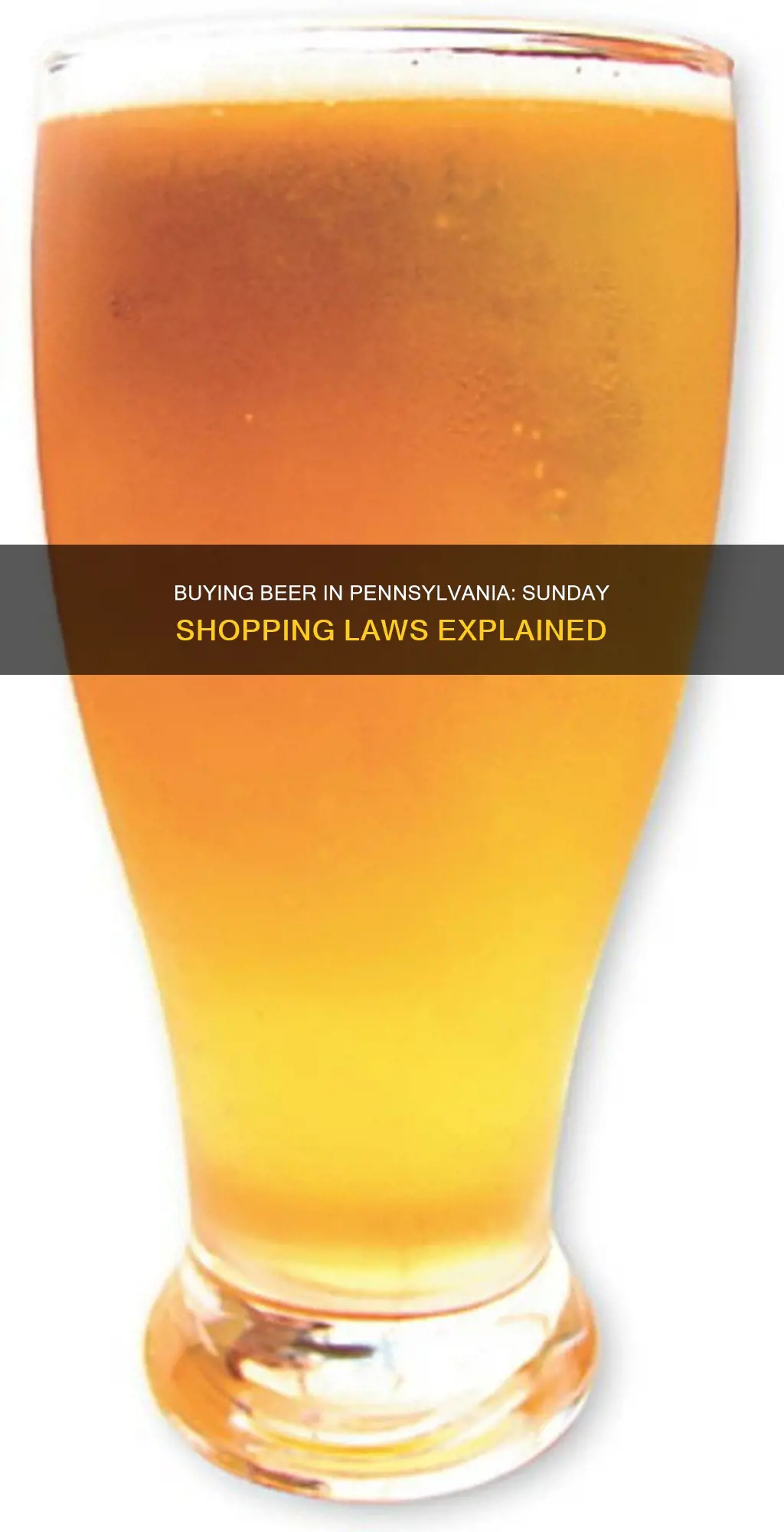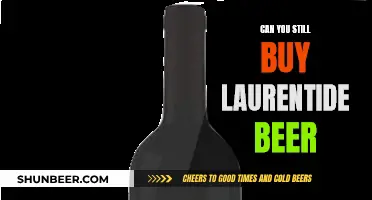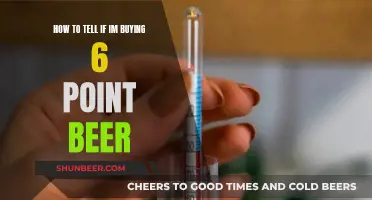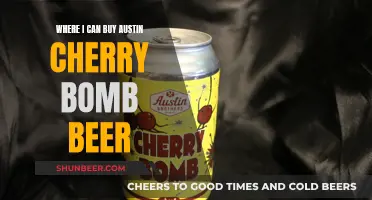
Pennsylvania's alcohol laws are among the most restrictive in the United States, with a complex history that can be traced back to the Prohibition era. While you can buy beer in Pennsylvania, the laws surrounding its sale and consumption on Sundays are particularly nuanced.
On Sundays, bars and restaurants can sell beer between 9 am and 2 am the following morning, provided they possess a Sunday sales permit. Beer distributors and breweries require a Sunday Sales Permit to sell beer on Sundays, and they can only do so from 9 am to 9 pm. Retailers with eating places or cafes may sell beer on Sundays from 11 am to 2 am the next day.
Pennsylvania's liquor laws have evolved in recent years, making the purchase of alcohol more convenient. However, the state's alcohol regulations remain intricate, with various license types and restrictions on sale quantities and locations.
| Characteristics | Values |
|---|---|
| Day of the week | Sunday |
| Time | 9:00 a.m. to 9:00 p.m. |
| Location | Bars, restaurants, beer distributors, breweries, retailers with eating places or cafes |
| Permit | Sunday Sales Permit |
| Age restriction | 21 or older |
What You'll Learn
- Beer can be purchased on Sundays in Pennsylvania
- Bars and restaurants can sell beer on Sundays from 9 am to 2 am Monday
- Beer distributors and breweries require a Sunday Sales Permit to sell beer on Sundays
- Retailers with eating places or cafes may sell beer on Sundays from 11 am to 2 am Monday
- There are no dry counties in Pennsylvania, but some municipalities have voted to become dry

Beer can be purchased on Sundays in Pennsylvania
Bars and Restaurants
Bars and restaurants can sell beer on Sundays between 9 a.m. and 2 a.m. the following morning, provided they possess a Sunday sales permit. These establishments are only permitted to sell beer for on-premise consumption, and to-go sales are not allowed.
Beer Distributors and Breweries
Beer distributors and breweries are permitted to sell beer on Sundays from 9 a.m. to 9 p.m. with a Sunday Sales Permit. There is no limit to the amount of beer that can be purchased per transaction at these locations. Distributors typically sell beer in cases, 12- or 6-packs, or as singles, and they can also sell kegs and fill growlers.
Retailers with Eating Places or Cafes
Retailers with eating places or cafes may sell beer on Sundays from 11 a.m. to 2 a.m. the following morning. These retailers have a maximum limit of 192 fluid ounces of beer per purchase, which is equivalent to 12 16-ounce cans.
Gas Stations and Grocery Stores
Gas stations with a specific license can sell up to two 6-packs of beer per transaction on Sundays. They can sell beer in 12-ounce cans or bottles in 6- or 12-packs, as well as 19 or 25-ounce cans, depending on the ABV.
Grocery stores in Pennsylvania can sell beer on Sundays from 9 a.m. to 2 a.m. with a Sunday Sales Permit. They are subject to the same restrictions as gas stations and have a maximum limit of 192 fluid ounces of beer per transaction.
Wineries and Fine Wine & Good Spirits Stores
Wineries are permitted to sell wine at storefronts in shopping malls, and wine can also be purchased from Fine Wine & Good Spirits stores, which are state-run. However, these stores do not sell beer.
Delivery and Curbside Pickup
Beer delivery and curbside pickup are legal options in Pennsylvania. Breweries and restaurants may sell and deliver beer between 8 a.m. and 11 p.m. on Sundays with a Sunday Sales Permit.
Age Restrictions
It is important to note that the minimum drinking age in Pennsylvania is 21, and anyone selling alcohol is required to check the ID of anyone they presume to be under the age of 35. Minors are not permitted to drink alcohol for any reason in the state.
Lucky Buddha Beer: Where to Buy the Beverage
You may want to see also

Bars and restaurants can sell beer on Sundays from 9 am to 2 am Monday
Pennsylvania has some of the strictest alcohol laws in the United States, which can be traced back to the Prohibition era and the influence of Gifford Pinchot, a "dry" governor who served from 1923 to 1935. Pinchot established the Pennsylvania Liquor Control Board to license establishments, regulate prices, and set serving hours, with the aim of "discourag[ing] the purchase of alcoholic beverages".
Bars and restaurants in Pennsylvania can sell beer from 7 a.m. to 2 a.m. Monday through Saturday. On Sundays, these establishments can sell beer from 9 a.m. to 2 a.m. Monday morning, provided they possess a Sunday Sales Permit. These licenses permit the sale of beer for on-premise consumption only, with no to-go sales. Bars and restaurants can sell beer on draft, as well as single bottles or cans.
The sale of beer in Pennsylvania is restricted to specific locations, each requiring a particular license. In addition to bars and restaurants, other places where beer can be purchased include:
- Breweries and taprooms: Open Monday to Saturday from 9 a.m. to midnight, and on Sundays from 9 a.m. to 9 p.m. for on-premise consumption. A Sunday Sales Permit is required for off-premise beer sales on Sundays but is not needed for on-premise consumption. Breweries and taprooms can sell beer on tap and in 6- or 12-pack configurations, 15-pack varieties, or packaged growlers.
- Licensed beer distributors: The primary retail source for beer sales in the state. They can operate from 8 a.m. to 11 p.m. Monday through Saturday, and on Sundays from 9 a.m. to 9 p.m. with a Sunday Sales Permit. Distributors can sell beer in any package size, including cases, 12- or 6-packs, singles, and kegs, with no limit on the amount per transaction.
- Gas stations: Permitted to sell up to two 6-packs of beer per transaction with a specific license. Beer can be sold in 12 oz cans or bottles in 6- or 12-packs, as well as 19 or 25 oz cans, depending on the ABV. Gas stations can sell beer from Monday at 2 a.m. until midnight Saturday.
- Grocery stores: Operating under the same restrictions as gas stations, with some hour-of-operation differences. Beer sales are allowed from Monday through Saturday between 7 a.m. and 2 a.m. through an interior connection to the grocery store. On Sundays, grocery stores can sell beer from 9 a.m. to 2 a.m. with a Sunday Sales Permit, though most stores are not open that late. There is a maximum limit of 192 fl. oz. on beer sales per transaction.
Buying Beer at Gas Stations in Minnesota: Is it Legal?
You may want to see also

Beer distributors and breweries require a Sunday Sales Permit to sell beer on Sundays
Beer distributors are the main retail location type for beer sales in Pennsylvania. They can sell beer Monday to Saturday from 8 am to 11 pm. On Sundays, they can sell beer from 9 am to 9 pm with a Sunday Sales Permit. There is no limit to the amount of alcohol that can be purchased per transaction at these distributors. They can sell beer in cases, 12- or 6-packs, or as singles, as well as single 19-25oz cans. They can also sell kegs and fill growlers.
Breweries and taprooms in Pennsylvania are open Monday to Saturday from 9 am to midnight and on Sundays from 9 am to 9 pm for on-premise consumption. A Sunday Sales Permit is required for off-premise beer sales on Sundays but is not necessary for on-premise consumption. Breweries and taprooms can sell beer on tap and for off-premise consumption, including 6- or 12-packs, 15-pack varieties, or packaged growlers.
Pennsylvania's liquor laws have loosened in recent years, making buying alcohol more convenient. In 2016, Governor Tom Wolf signed Acts 39 and 166 into law, easing restrictions on beer and wine sales and shipping and allowing for expanded state store hours. However, the state still has complex and restrictive alcohol laws, and beer distributors and breweries must obtain a Sunday Sales Permit to sell beer on Sundays.
Best Places to Buy Ballantine Beer
You may want to see also

Retailers with eating places or cafes may sell beer on Sundays from 11 am to 2 am Monday
Pennsylvania has some of the strictest alcohol regulations in the United States, with a complex history of liquor laws. The state has a number of different types and sub-categories of liquor licenses, with varying restrictions.
Retailers with eating places or cafes (known as Eating Place Retail Dispenser licensees) are permitted to sell beer on Sundays from 11 am to 2 am Monday. These retailers are typically delis or corner stores, and they are only permitted to sell malt and brewed beverages (beer) and not wine or spirits. They can sell up to 192 fluid ounces of beer in a single transaction for off-premises consumption.
These retailers must adhere to specific guidelines, including maintaining a minimum of 300 square feet of space, with tables and seating for at least 30 patrons, and a functioning kitchen or food preparation area. They must also have a current and valid health license issued by the governing municipal authority.
The Sunday sales permit allows retailers with eating places or cafes to extend their operating hours and provide customers with the convenience of purchasing beer on Sundays. This permit is crucial for these establishments to boost their sales and cater to customer needs during the weekend.
It is important to note that the sale of alcohol in Pennsylvania is strictly regulated, and retailers must comply with all applicable laws and guidelines to maintain their licenses. The Pennsylvania Liquor Control Board is responsible for licensing establishments, setting serving hours, and regulating prices.
Myrtle Beach Beer Laws: Sunday Shopping Explained
You may want to see also

There are no dry counties in Pennsylvania, but some municipalities have voted to become dry
Pennsylvania's liquor laws are considered some of the most restrictive in the United States. The state's complex alcohol laws can be traced back to the Prohibition era and the stance of Gifford Pinchot, who served as governor from 1923 to 1935. Pinchot was a teetotaler and even after Prohibition was repealed in 1933, he maintained his tough stance on alcohol control. He believed that the best way to prevent corruption in the alcohol industry was through state control. This led to the creation of the Pennsylvania Liquor Control Board, which licenses establishments, sets serving hours, and regulates prices.
While there are no dry counties in Pennsylvania, there are many municipalities that are at least partially dry. As of January 2019, there were 683 municipalities that were at least partially dry. Many of these dry or moist municipalities are small communities in rural areas, with a strong historical connection to Prohibitionist sentiments. An analysis by LNP found that nearly 700 townships and boroughs (about 27% of the state's local governments) ban the sale of beer and liquor altogether or are at least dry in some form.
The Pennsylvania Liquor Control Board's data shows that 530 local governments ban retail sales of both liquor and beer, 122 municipalities prohibit only retail beer sales, and 32 places ban retail liquor sales. These bans often date back to the post-Prohibition era of the 1930s, with some townships and boroughs reinstating bans or adding new ones in the following decades. For example, East Drumore Township in southern Lancaster County went dry in the spring of 1934, just a few months after Prohibition was repealed, and reaffirmed this ban in a 1997 ballot.
The state's liquor laws have seen some changes in recent years, with Governor Tom Wolf signing Acts 39 and 166 into law in 2016. These laws loosened restrictions on beer and wine sales and shipping and expanded the hours of state-owned liquor stores. However, Pennsylvania's alcohol laws still present a confusing landscape for consumers, with different types of licenses and restrictions on how and where alcohol can be purchased.
Non-Alcoholic Beer: An 18-Year-Old's Legal Drink?
You may want to see also
Frequently asked questions
Yes, you can buy beer in PA on Sunday, but the timings vary depending on the type of location.
Bars and restaurants can sell beer on Sundays between 9 a.m. and 2 a.m. on Monday morning if they have a Sunday sales permit.
Beer distributors and breweries can sell beer on Sundays from 9 a.m. to 9 p.m. with a Sunday Sales Permit.
Retailers with eating places or cafes may sell beer on Sundays from 11 a.m. to 2 a.m. on Monday morning.
Licensed retail locations, including bars and restaurants, can sell beer between 7 a.m. and 2 a.m. from Monday through Saturday.
Yes, there are quantity restrictions at certain locations. Grocery stores have a 192 fl. oz. maximum on beer sales, while bars and restaurants are limited to selling beer for on-premise consumption only.







